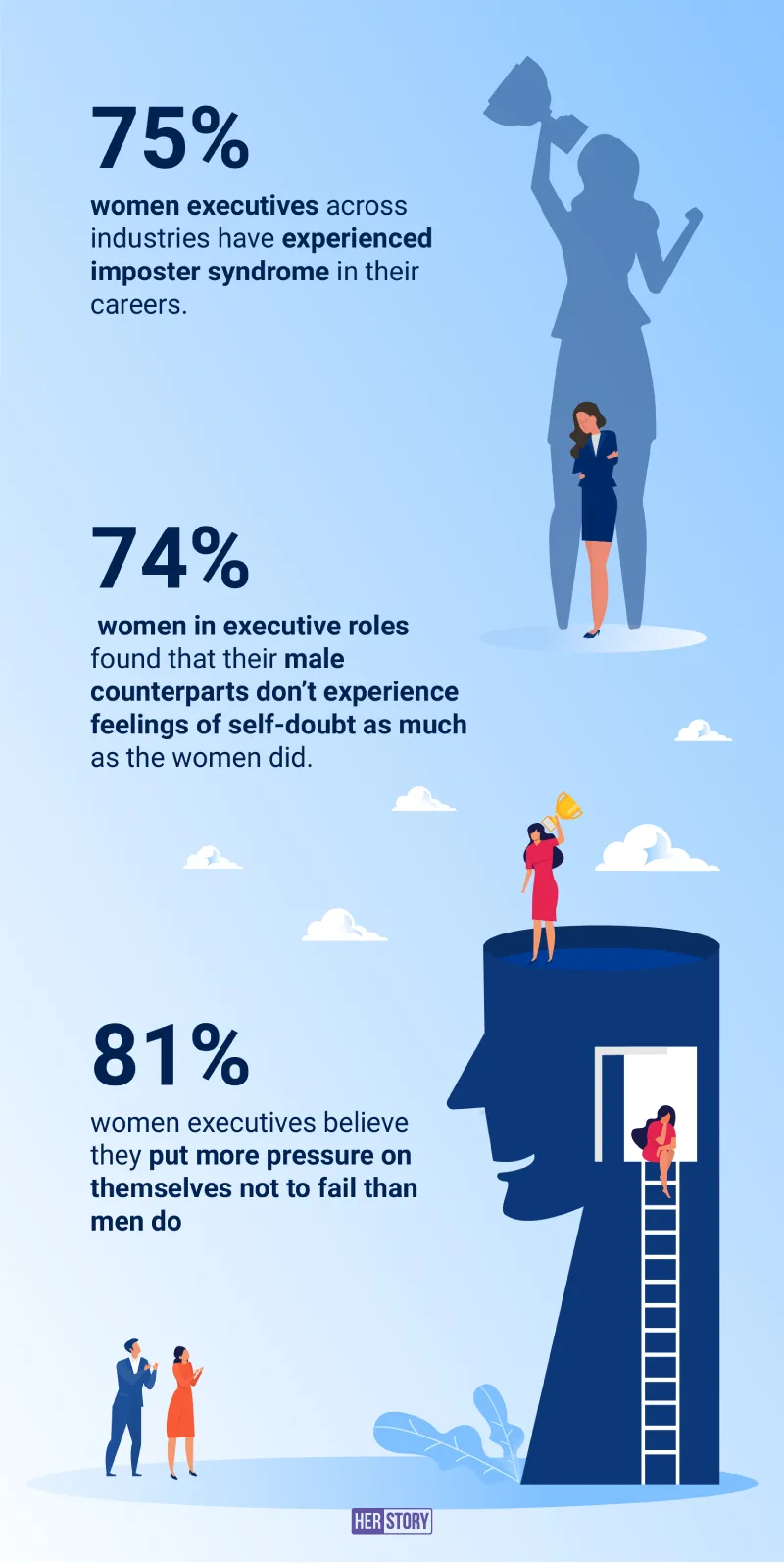Impostor syndrome: Why women leaders often fail to reap the benefits of their success
Impostor syndrome is the inability to believe that one's success is deserved or legitimately achieved as a result of efforts or skills. While scientifically gender-neutral, it seems to affect women more than men.
Sonali*, 35, was thrilled when she was recently promoted to lead her team. A dream come true, after years of hard work, long nights, and dedication, the new position seemed like a well-earned boon. But soon, it all fell apart.
People started questioning her decisions and ideas and undermining her authority. Slowly, Sonali began to doubt herself.
“I wasn’t as sure as I was a few months back. I began to wonder where I was going wrong. I just didn’t know what needed to be done or how it could be done. If my seniors praised my work, I didn’t feel I deserved it. Surely, my team knew better,” she tells HerStory.
Sonali had fallen victim to the dreaded ‘impostor syndrome'

Image Credit: Daisy
Are you an impostor?
In psychological terms, impostor syndrome is defined as the persistent inability to believe that one's success is deserved or has been legitimately achieved as a result of one's own efforts or skills.
And, data says it affects more women than men.
Even global business leaders like Facebook COO Sheryl Sandberg, former First Lady of the United States Michelle Obama, and several other women leaders have spoken about being a victim of impostor syndrome.
Last October, a KPMG study reported that a whopping 75 percent of women executives across industries have experienced impostor syndrome in their careers. In fact, over 85 percent of the 750 respondents believed impostor syndrome to be a commonly experienced phenomenon by women.
On the other hand, close to 74 percent of the women in executive roles found that their male counterparts don’t experience feelings of self-doubt as much as they did. And over 81 percent believe they put more pressure on themselves not to fail than men do.
An HBR report says women feel impostor syndrome more than their male counterparts — primarily because of gender biases and prejudices. Garima Juneja, psychologist and Founder, LightRoom Therapy explains,
“The are several reasons why women face impostor syndrome more than men. And, it is primarily because women are simply expected to do more to prove their standing. They always have to make the tougher choices, whether it is at work or at family or balancing the two. Many women during the pandemic were asked to leave because there is a mindset that they aren’t the primary breadwinners. And since that is a basic mindset, much of their work isn’t taken seriously.”
How diverse workplaces can help
The more women feel like an impostor, the more they want to prove themselves. As a result, they either burn out or drop out from the workforce.
In fact, it starts even before they join the workforce. In Lean In, Sheryl Sandberg writes that men apply to jobs when they are only 60 percent qualified while women believe they have to be 100 percent qualified to apply. A 2019 LinkedIn report found that women are less aggressive than men when it comes to applying for jobs.
While there could be many reasons behind this, some women are often led to believe they don’t belong in corporate workplaces, probably because they are told – implicitly or explicitly – that they are infiltrating a male-designated space.
A founder of a leading B2C startup says, on the condition of anonymity, he has seen this throughout his career, adding that women just have to work harder.
“A female friend and I started working in similar senior roles. I noticed I could easily convince my clients and managers of my worth. And this wasn't because I was better than her; it was because they were downright condescending and difficult with her,” he recalls.
However, things are slowly changing. Research proves that the more diverse a workforce is, the higher the productivity. Simply put, workplace diversity is not just to balance the scales but also to bring in a set of employees with a more diverse set of skills, qualifications, and experiences.
Gender and ethnic diversity in employees, and at a leadership level, leads to more positive outcomes for companies and higher productivity. It was in 2015 that a McKinsey report discovered this critical impact of diversity on the bottom line.
The research revealed that among more than 366 public companies, the ones in the top quartile for ethnic and racial diversity in management were 35 percent more likely to have financial returns above their industry mean, and those in the top quartile for gender diversity were 15 percent more likely to have returns above the industry mean.

Image: Daisy
Data: KPMG
Dealing with microaggression
According to HBR, even if women display resilience, strength, drive, and ambition, they have to “battle several microaggressions, focus on stereotypes, as well as expectations and assumptions”.
Garima explains this means women have to simply prove themselves harder. Another senior woman executive, Pavitra* says the problem doesn’t just arise from the subordinates, but colleagues and peers who needed to be supportive just weren’t.
“The same people who were friendly and supportive before I held a leadership position were now downright rude, or passive aggressive and completely non-cooperative. And this wasn’t just the men, even the women on my team were difficult. I would work on different ways to gain their trust, took on more work than I was supposed to. Many times, I took on even their share of the work. And yet nothing seemed enough,” she adds.
Pavitra recalls that sometimes, her subordinates simply didn’t take on assignments they were explicitly asked to. “It was defiance. Funnily, if a male senior asked for the completion of the assignment, it would be done,” she adds.

Image Credit: Daisy Mahadevan
It is okay to not be perfect
Companies need to have open lines of communication and safe spaces to talk.
Garima explains “There is also a strong need to seek validation. While this is common, there is something that we need to stop trying to control if you are facing impostor syndrome. The first step is to start taking feedback and criticism at face value. While the positives are discounted, it is the negatives that overplay in their minds. The first step is learning to take everything on the face value and not attach any further thoughts to it.”
She adds that women always believe they need to achieve perfection. “Nothing lesser can be considered worthy enough of praise,” she says.
But the problem begins when you want to get everything to perfection. According to Garima, it is time women start believing in their own abilities, even if it is a little less than 100 percent.
(*These names have been changed in this story on request.)
Edited by Saheli Sen Gupta




![[100 Emerging Women Leaders] Believe in yourself and the world will believe in you: Ritu Phogat, the latest ‘Dangal’ sister to enter the ring](https://images.yourstory.com/cs/4/a9efa9c02dd911e9adc52d913c55075e/RituPhogat-IMGL9633-1620733808586.png?fm=png&auto=format&h=100&w=100&crop=entropy&fit=crop)
![[100 Emerging Women Leaders] How fashion designer Kavya Singh Kundu is helping Jamdani weavers upcycle their dead stock during the pandemic](https://images.yourstory.com/cs/2/a9efa9c02dd911e9adc52d913c55075e/Imagez8cq-1621519935269.jpg?fm=png&auto=format&h=100&w=100&crop=entropy&fit=crop)




